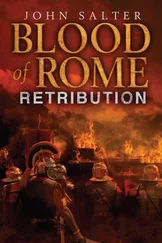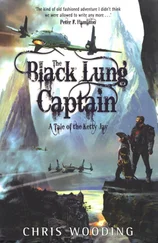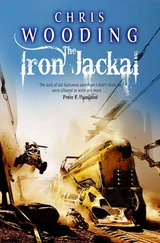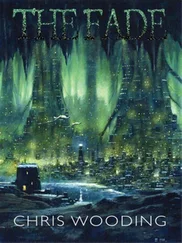‘Hey!’ he said, before Malvery grabbed his head and smashed his skull against the wall of the passageway. He slumped to the floor, unconscious.
‘Not big on talking your way out of things, are you?’ Crake observed, as they dragged the unfortunate crewman into a side room.
‘My way’s quicker,’ he said, adjusting his round green glasses. ‘No danger of misunderstanding.’
The side room was a galley, empty now, its stoves cold. Crake shut the door while Malvery ran some water into a tin cup. The crewman—a young, slack-jawed deckhand—began to groan and stir. Malvery threw the water in his face. His eyes opened and slowly focused on Pinn, who was standing over him, pointing a pistol at his nose.
Malvery squatted down next to the prisoner and tapped him on the head with the base of the tin cup, making him wince. ‘Captain’s cabin,’ he said. ‘Where?’
They left the deckhand bound and gagged in a cupboard of the galley. Pinn was for shooting him, but Crake wouldn’t allow it. Pinn’s argument that he was ‘just a deckhand, no one would miss him’ carried little weight.
The captain’s cabin was locked, of course, but Crake had come prepared. Given the time and the materials, it was a simple trick for him to produce a daemonic skeleton key. He slipped it into the lock and concentrated, forming a mental chord in the silence of his mind, awakening the daemon thralled to the key. His fingers became numb as it sucked the strength from him. Though small, it was hungry, and beyond the power of any but a trained daemonist to handle.
The daemon extended invisible tendrils of influence, feeling out the lock, caressing the levers and tumblers. Then the key turned sharply, and the door was open.
Malvery patted him on the shoulder. ‘Good job, mate,’ he grinned. Crake felt oddly warmed by that. Then he heard the distant pounding echoing through the Delirium Trigger, and he remembered Bess.
‘Let’s get this done,’ he said, and they went inside.
Dracken’s cabin was spotlessly clean, but the combination of brass, iron and dark wood gave it a heavy and oppressive feel. A bookshelf took up one wall, a mix of literature, biography and navigational manuals interspersed with shiny copper ornaments. Some of the titles were in Samarlan script, Crake noticed. He spotted The Singer and the Songbird and On the Domination of Our Sphere, two great works by the Samarlan masters. He found himself taken by an unexpected admiration for a pirate who would—or even could—read that kind of material.
Pinn and Malvery had gone straight to the desk on the far side of the cabin, which sat next to a sloping window of reinforced windglass. The light from the hangar spilled onto neatly arranged charts and a valuable turtleshell writing set. Crake had a sudden picture of Dracken looking thoughtfully out of that window at a sea of clouds as her craft flew high in the sky.
Pinn pawed through the charts, scattering them about and ruining Crake’s moment of reverie. ‘Nothing,’ he said.
Malvery’s eye had fallen on a long, thin chest on a shelf near the desk. It was padlocked. ‘Crake!’ he said, and the daemonist came over with his skeleton key. The lock was trickier than the one that secured the cabin door, but in the end, it couldn’t stand up to the key.
It was full of rolled-up charts. Atop them was what seemed to be a large compass. Malvery passed the compass to Crake, then began scanning through the charts with Pinn. Crake listened to the booming coming from the depths of the Delirium Trigger as he studied Malvery’s discovery.
Keep pounding, Bess, he thought. As long as I hear you, I know you’re all right.
The compass was so big that Crake could barely hold it in one hand. It was also, on closer examination, not a compass at all. It had no North-South-West-East markings, and it had four needles instead of one, all of equal length and numbered. Additionally, there were eight tiny sets of digits, set in pairs, with each digit on a rotating cylinder to allow it to count from zero to nine. These set pairs were also numbered one to four, presumably to correspond with the needles. The needles were all pointing in the same direction, no matter which way he turned it, and the numbers were all at zero.
‘I think we found ’em!’ Malvery said. He scooped up all the charts from the chest and shoved them inside his threadbare jersey, then looked at Crake. ‘Is that the device you were after?’
‘I believe it is.’
Crake had little doubt that what he held was the mysterious device Thade had mentioned. The strangeness of the compass, and the fact that it had been placed in the same chest as the charts, was enough for him.
‘We should—’ he began, but then he saw a movement in the doorway, and there was the loud report of a gun.
Malvery had seen it too: one of the crew, a black-haired, scruffy man, drawn by the sound of voices and the sight of the captain’s door left open. On seeing the intruders, the crewman hastily pulled his gun and fired. The doctor ducked aside, fast enough so that the bullet only grazed his shoulder.
Another gun fired, an instant after the first. Pinn’s. The crewman gaped, and a bright swell of blood soaked out from his chest into his shirt. He staggered back and slid down the wall of the passageway outside, disbelief in his eyes.
‘We got what we came for,’ said Malvery, his voice flat. ‘Time to go.’
The crewman lay in the passageway, gasping for air. Pinn and Malvery passed without looking at him, pausing only to steal his pistol. Crake edged by as if he was contagious, horrified and fascinated. The crewman’s eyes followed his, rolling in their sockets with an awful, empty interest.
Crake found himself pinned by that gaze. It was the look of a man unprepared, shocked to find himself at the gates of death so swiftly and unexpectedly. There was bewilderment in that look. The dying man was crushed by the knowledge that, unlike every other desperate moment in his life, there was no second chance, no way that wit or strength could pull him clear. It filled Crake with terror.
Now Crake knew why Malvery and Pinn hadn’t looked.
He was trembling as he followed his companions up the corridor. After a moment, he remembered Bess. He put the whistle to his lips, the whistle tuned to a frequency that only she could hear, and he blew. It was a note different from the one he used to wake her up and put her to sleep. This one was a signal.
Time to come back, Bess.
‘Any moment now, boys!’ the bosun yelled, as the bulkhead door screeched and lurched forward on its hinges. It was possible to see glimpses of movement through the gap at the top of the door, where the eight-inch steel had bent forward under the assault of the creature in the cargo hold. Enough to see that there was something massive behind, something as fearsome as its roaring suggested.
The crew braced themselves, aiming their revolvers and lever-action shotguns. The man operating the tripod-mounted rotary cannon flexed his trigger finger, wiped sweat from his brow and sighted. The door had given up the struggle now. Each blow could be the one that brought them face to face with the thing in the hold.
Doubt was on their faces. All their guns seemed suddenly pitiful. Only discipline kept them in place, crowded in the dim passageway.
The door buckled inwards, its upper hinge coming away completely. One more blow. One more.
But the final blow didn’t come. And still it didn’t come. And, after a time, it seemed it wasn’t going to.
The men let out their pent-up breath, unsure what this new turn of events might mean. Each had been resigned to their fate. Had they been reprieved? They didn’t dare to hope.
Some of them began to whisper. What had happened? Why had it stopped? Where had the thing in the hold gone?
Читать дальше












